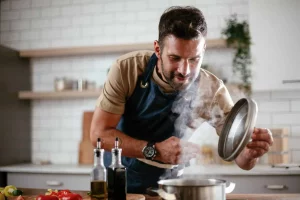In the realm of addiction recovery strategies, a fresh approach is emerging: nurturing recovery through culinary insights. By leveraging the therapeutic power of cooking and food, individuals can ignite emotional healing and personal growth. This innovative method provides a unique avenue for self-expression, fostering resilience and empowerment. What makes cooking therapy so impactful, and how can individuals utilize the transformative potential of food to support their recovery journey?
Key Takeaways
- A holistic approach to addiction recovery incorporates physical, emotional, and psychological aspects for a unique and ongoing recovery journey.
- A well-balanced diet significantly influences physical and mental well-being, reducing cravings and improving mood during recovery.
- Culinary therapy combines cooking skills with emotional reflection, promoting resilience, self-discovery, and sustainable recovery strategies.
- Nourishing relationships through shared meals cultivate empathy, trust, and support, helping individuals feel seen and heard during recovery.
- Wholesome eating habits, rich in complete foods, fruits, and vegetables, regulate mood and reduce cravings, supporting overall well-being and personal recovery strategies.
Understanding Addiction Recovery Strategies
Effective addiction recovery strategies involve a holistic approach that addresses the physical, emotional, and psychological aspects of addiction, recognizing that recovery is a unique and ongoing process for each individual. A thorough strategy incorporates evidence-based therapies, support systems, and self-care practices, empowering individuals to reclaim their lives and nurture a sense of belonging and purpose.
Nutrition’s Impact on Recovery Outcomes
Within the sphere of addiction recovery strategies, the significance of nutrition in influencing recovery outcomes cannot be overstated, as a well-balanced diet has been shown to have a profound impact on both physical and mental well-being. A nutritious diet can ease symptoms of withdrawal, reduce cravings, and improve mood, ultimately enhancing overall recovery outcomes and supporting long-term sobriety.
Culinary Therapy for Emotional Healing
Through the creative expression of cooking therapy, individuals in recovery can tap into the therapeutic benefits of cooking, nurturing emotional healing and self-discovery. By combining cooking skills with emotional reflection, individuals can develop a deeper understanding of themselves, promoting resilience and promoting sustainable addiction recovery strategies.
Nourishing Relationships Through Food
As individuals in recovery cultivate nourishing relationships through food, they can develop a sense of community and social connection, a vital component of effective addiction recovery strategies. Shared meals can encourage empathy, trust, and support, helping individuals feel seen and heard. By breaking bread together, individuals can build strong bonds, promoting a sense of belonging and facilitating lasting recovery.
Wholesome Eating for Lasting Recovery
As individuals in recovery cultivate a sense of community through shared meals, they can further bolster their addiction recovery options by adopting wholesome eating habits that promote lasting recovery. A balanced diet rich in complete foods, fruits, and vegetables can help regulate mood, reduce cravings, and support overall well-being, ultimately strengthening personal addiction recovery strategies.
Frequently Asked Questions
Can I Eat Whatever I Want During Addiction Recovery?
During addiction recovery, it’s crucial to prioritize nutrition, but that doesn’t mean depriving yourself. Focus on balanced, nutrient-dense meals that nourish your body and support your recovery journey, rather than indulging in unrestricted eating.
How Do I Deal With Food Cravings During Recovery?
To manage food desires during recovery, identify triggers, stay hydrated, and practice mindful eating; incorporate nutrient-dense foods, and consider seeking support from a registered dietitian or nutritionist for personalized guidance.
Will Nutrition Therapy Help Me Overcome Addiction?
Nutrition therapy can play an essential role in overcoming addiction by addressing nutritional deficiencies, stabilizing blood sugar, and reducing cravings, ultimately supporting a holistic recovery plan and promoting long-term sobriety.
Can I Use Cooking as a Coping Mechanism for Stress?
Cooking can be a therapeutic outlet for stress management, providing a sense of control and accomplishment. Engaging in cooking activities can help distract from cravings and emotions, nurturing a healthier coping mechanism for stress and anxiety.
Do Certain Foods Trigger Addiction Relapse?
Research suggests that certain foods, particularly those high in sugar, salt, and unhealthy fats, can trigger addiction relapse by stimulating the brain’s reward system, leading to cravings and compromising recovery efforts.
Conclusion
In summary, incorporating cooking insights into addiction recovery strategies offers a unique and empowering approach to personal healing and growth. By utilizing the therapeutic benefits of cooking and nutrition, individuals can nurture emotional healing, self-discovery, and resilience. This creative strategy promotes a deeper understanding of oneself while providing a creative outlet for expressing emotions. Ultimately, nourishing recovery through cooking insights cultivates a sense of empowerment and well-being, supporting lasting recovery outcomes.
You may also love to read: The Advantages of Interactive Menu Planning in Catering


